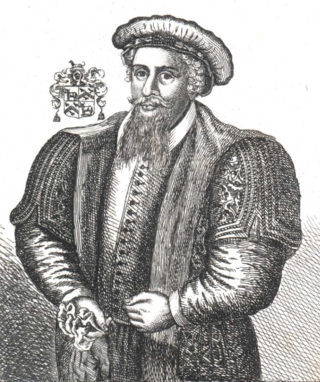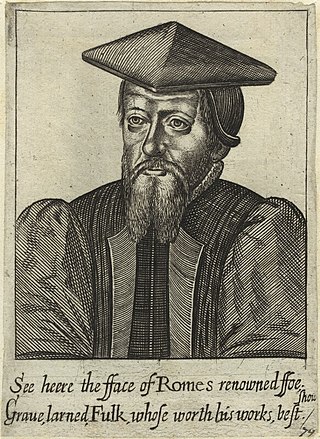Related Research Articles

A dictionary is a listing of lexemes from the lexicon of one or more specific languages, often arranged alphabetically, which may include information on definitions, usage, etymologies, pronunciations, translation, etc. It is a lexicographical reference that shows inter-relationships among the data.

Arthur Golding was an English translator of more than 30 works from Latin into English. While primarily remembered today for his translation of Ovid's Metamorphoses because of its influence on William Shakespeare's works, in his own time he was most famous for his translation of Caesar's Commentaries, and his translations of the sermons of John Calvin were important in spreading the doctrines of the Protestant Reformation.
Abraham Fraunce was an English poet.

A vernacular or vernacular language is in contrast with a "standard language." It refers to the language or dialect that is spoken by people that are inhabiting a particular country or region. The vernacular is typically the native language, normally spoken informally rather than written, and seen as of lower status than more codified forms. It may vary from more prestigious speech varieties in different ways, in that the vernacular can be a distinct stylistic register, a regional dialect, a sociolect, or an independent language. Vernacular is a term for a type of speech variety, generally used to refer to a local language or dialect, as distinct from what is seen as a standard language. The vernacular is contrasted with higher-prestige forms of language, such as national, literary, liturgical or scientific idiom, or a lingua franca, used to facilitate communication across a large area.

Giovanni Florio (1552–1625), known as John Florio, was an English linguist, poet, writer, translator, lexicographer, and royal language tutor at the Court of James I. He is recognised as the most important Renaissance humanist in England. Florio contributed 1,149 words to the English language, placing third after Chaucer and Shakespeare, in the linguistic analysis conducted by Stanford professor John Willinsky.
"The First Nowell", also known as "The First Noel ", is a traditional English Christmas carol with Cornish origins, most likely from the early modern period, although possibly earlier. It is listed as number 682 in the Roud Folk Song Index.
The Latin phrase gradus ad Parnassum means "steps to Parnassus". It is sometimes shortened to gradus. The name Parnassus was used to denote the loftiest part of a mountain range in central Greece, a few kilometres north of Delphi, of which the two summits, in Classical times, were called Tithorea and Lycoreia. In Greek mythology, one of the peaks was sacred to Apollo and the nine Muses, the inspiring deities of the arts, and the other to Dionysus. The phrase has often been used to refer to various books of instruction, or guides, in which gradual progress in literature, language instruction, music, or the arts in general, is sought.

Dr Mark Ridley was an English physician and lexicographer, born in Stretham, Cambridgeshire, to Lancelot Ridley. He became physician to the English merchants in Russia, and then personal physician to the Tsar of Russia.
Randle Cotgrave was an English lexicographer. In 1611 he compiled and published A Dictionarie of the French and English Tongues, a bilingual dictionary that represented a breakthrough at the time and remains historically important.

William Fulke was an English Puritan divine.
Richard Mulcaster is known best for his headmasterships of Merchant Taylors' School and St Paul's School, both then in London, and for his pedagogic writings. He is often regarded as the founder of English language lexicography. He was also an Anglican priest.
John Ryder (1562–1632) was a lexicographer who published an English-Latin Dictionary that was widely used in the 17th century. A favourite of Elizabeth I, he was Dean of St. Patrick's Cathedral, Dublin, and the Anglican Bishop of Killaloe.
Christopher Middleton was an English poet and translator.

Abraham Fleming was an English clergyman. He was a prolific writer and translator, who contributed to others' texts. He was also an editor and poet, serving as a chief to the second edition of Holinshed's Chronicles (1587). Fleming was a manuscript collector. By the 1730s, Fleming's collection was owned by Francis Peck. Its subsequent fate is unclear.
Edward Grant was an English classical scholar, Latin poet, and headmaster of Westminster School. He was also the first biographer of Roger Ascham.
John Udall (1560?–1592) was an English clergyman of Puritan views, closely associated with the publication of the Martin Marprelate tracts, and prosecuted for controversial works of a similar polemical nature. He has been called "one of the most fluent and learned of puritan controversialists".
Claudius Hollyband was a 16th-century French-English linguist, philologist, phonologist, lexicographer and instructor of English, French, Italian and Latin. He was the author of many books and treatises regarding language, including one of the earliest French-English dictionaries, A Dictionarie French and English, published in London in 1593.
Before Samuel Johnson's two-volume A Dictionary of the English Language, published in 1755 and considered the most authoritative and influential work of early English lexicography, there were other early English dictionaries: more than a dozen had been published during the preceding 150 years. This article lists the most significant ones.
John Sanderson was an English Roman Catholic priest, known as a writer on logic.
Thomas Speght was an English schoolmaster and editor of Geoffrey Chaucer.
References
- ↑ "Barrett, John (BRT551J)". A Cambridge Alumni Database. University of Cambridge.
- ↑ Ralph Churton, Life of Alexander Nowell, p. 220
- ↑ Restituta: or Titles, Extracts, and Characters of Old Books in ..., Volume 3
![]() This article incorporates text from a publication now in the public domain : "Baret, John". Dictionary of National Biography . London: Smith, Elder & Co. 1885–1900.
This article incorporates text from a publication now in the public domain : "Baret, John". Dictionary of National Biography . London: Smith, Elder & Co. 1885–1900.